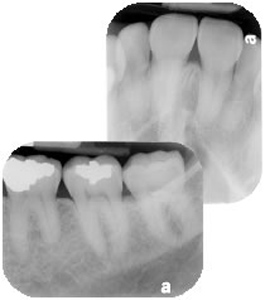
Dental X-rays are taken for different reasons. When you first visit a new dentist, normally they will take a Full Mouth Series of x-rays. This can be up to 26 films taken to show every tooth and every root in your mouth. This will give us a base line to start treatment. After that, once a year you will need check-up x-rays, or bitewings. This is 2-8 films used to check between the teeth for decay and bone levels. Every 5 years, a Full Mouth Series is done, instead of check up x-rays, with a complete examination. If you have pain, we may take 1 or 2 x-rays to help diagnose the problem.
Some people think they should not have dental x-rays because of radiation exposure. But, dental x-rays only expose us to a very small amount of radiation. Much smaller than naturally occurring cosmic radiation and radon. We also limit your full body exposure with the use of a lead apron. This apron also has a thyroid collar that goes around the neck.
If you have questions about Dental X-rays, talk to your dental professional today!













